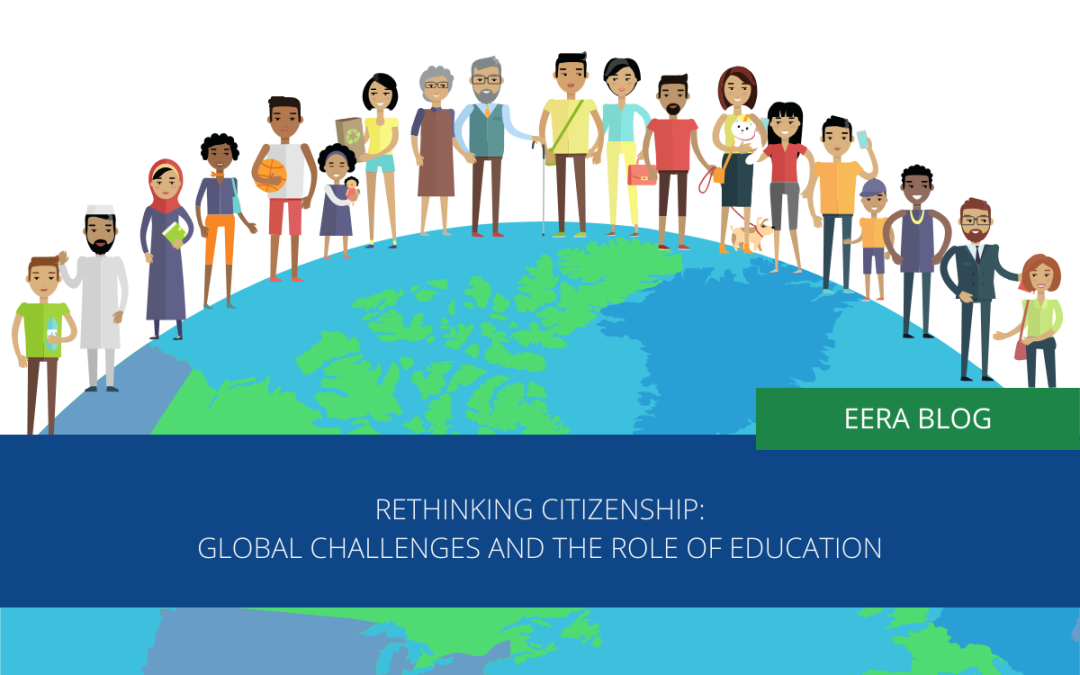The paradox of universal rights and freedoms being exclusively reserved for members of a nation-state through national citizenship has led me to explore the newly emerging ideas of global citizenship and global citizenship education (GCED). While global forms of citizenship aim to transcend the particularism of national rights, the role of education in fostering these ideals is central—especially in Europe, where regional frameworks like the European Union (EU) already provide an intermediary model between national and global citizenship. Yet, these frameworks are constrained by institutional and political realities, as citizenship remains fundamentally rooted in national legal systems. This raises critical questions about the feasibility of transnational citizenship and the extent to which educational initiatives can genuinely reshape these structures.
The interplay between global and European citizenship
Few would dispute that all individuals, regardless of nationality, are entitled to fundamental rights such as life, liberty, and education (United Nations, 1948). Yet, the institutionalisation of these rights predominantly occurs at the national level (Oman, 2009, p. 280-281), creating tensions between the universality of rights and the particularism of national citizenship (Fudge, 2004, p. 32). Global citizenship is often framed as a way to overcome these limitations, yet its feasibility remains contested.
In Europe, however, the EU provides a unique context where, although citizenship is confined to a single nation-state, rights and freedoms extend across member states (The Charter of Fundamental Rights of the European Union, 2000). The EU’s concept of citizenship, established under the Maastricht Treaty (1992), includes rights such as free movement, the ability to work and reside in any member state, and access to supranational legal protections. While this model showcases the potential of regional cooperation, its implementation remains uneven, with significant disparities in how member states apply and enforce these rights. Persistent challenges include restrictions on labor mobility, unequal access to social welfare systems, and the treatment of migrants and asylum seekers, highlighting the complexities of balancing national sovereignty with transnational governance.
Education as a catalyst for citizenship beyond borders
Education plays a pivotal role in shaping how individuals understand and enact citizenship. As part of broader efforts to reimagine civic education, UNESCO has promoted Global Citizenship Education (GCED) to foster a sense of interconnectedness and ethical responsibility in a globalised world. Schools are increasingly seen not just as places for academic instruction, but as spaces where students learn to navigate complex global realities and develop ethical, inclusive perspectives (UNESCO, 2014).
Officially launched by the UN in 2012, GCED is a ‘framing paradigm’ that calls for ‘multifaceted,’ ‘transformative,’ and ‘lifelong’ civic learning (UNESCO, 2015, p. 15). Enshrined in Sustainable Development Goals (SDG) Target 4.7, it combines ‘formal and informal approaches, curricular and extracurricular interventions, and conventional and unconventional pathways to participation’ (UNESCO, 2015) with the aim of developing core competencies in learners, including:
a) Deep knowledge of global issues and universal values like justice, equality, and dignity
b) Cognitive skills for critical, systemic, and multi-perspective thinking
c) Non-cognitive skills such as empathy, conflict resolution, and cross-cultural communication
d) Behavioural capacities to act collaboratively and responsibly for the collective good (UNESCO, 2013).
However, these aspirations remain largely theoretical, as the challenge lies in bridging this vision with concrete implementation strategies that can be adapted to diverse educational systems.
Challenges and prospects in global citizenship education
Despite its potential, GCED faces notable conceptual and practical challenges. One concern is UNESCO’s “thin” conceptualisation of global citizenship, which does not fully address the role of the nation-state, the legal basis of citizenship rights, or the responsibilities that come with them. This ambiguity limits its effectiveness as a policy framework. A related challenge is its implementation. While UNESCO supports national efforts through curriculum development and learning materials, its influence remains largely advisory. Member states submit progress reports to UNESCO’s Executive Board every four years, yet the ‘Recommendation on Education for Peace and Human Rights, International Understanding, Cooperation, Fundamental Freedoms, Global Citizenship, and Sustainable Development’ (2023) remains a non-binding guidance document rather than a legally binding framework. This weakens its capacity to ensure meaningful integration across diverse national contexts.
Additionally, UNESCO’s discourse has increasingly emphasised preparing education systems for so-called ‘future’ challenges rather than addressing the structural barriers that already hinder effective responses to global issues (Mochizuki & Vickers, 2024). This shift also reflects a broader trend toward the depoliticisation of education policy discussions. As a result, UNESCO’s global citizenship agenda appears to prioritise seemingly apolitical, simplistic solutions to global challenges—an approach that not only restricts political debate but also diverts attention from socio-economic injustices and weakens civic agency (Bryan, 2022). This raises concerns about whether GCED can truly empower learners to challenge dominant global structures rather than simply adapt to them.
At the same time, global challenges such as climate change, migration, and social inequality require collective solutions, such as global citizenship education. While GCED alone cannot resolve these issues, it offers a valuable framework for fostering civic engagement and ethical responsibility across borders. However, without clearer institutional backing and mechanisms for accountability, its impact remains uneven. A crucial challenge lies in moving beyond broad rhetoric to establish sustainable pathways for integrating GCED into national education systems in ways that complement existing structures.
Towards an integrated model of citizenship education
In Europe, citizenship education already covers the EU’s institutions, functions, integration processes, and core values, fostering both awareness and a sense of belonging to the EU community (Bacian & Huemer, 2023). Expanding this framework to incorporate global citizenship could help learners develop the skills and knowledge needed to engage with increasingly interconnected social, economic, and environmental challenges. The EU itself serves as a tangible model of transnational belonging, demonstrating how rights and responsibilities can extend beyond national borders. However, meaningful transnational citizenship depends on strong institutional frameworks, legal mechanisms, and sustained political cooperation – elements that, while central to the EU model, remain unevenly developed and contested within the Union itself.
While the EU has institutionalised transnational citizenship on a regional scale, its limitations highlight the challenges of implementing GCED on a global level, such as discrepancies in the enforcement of rights, restrictions on labor mobility, and the treatment of migrants – issues that reveal the difficulty of extending citizenship beyond the nation-state.
Despite these challenges, education remains one of the most promising tools for fostering mutual understanding and preparing individuals to engage with global issues in meaningful ways. To maximise its impact, greater institutional collaboration is needed to ensure that education policies are responsive to the realities of citizenship in a globalised world. GCED has the potential to bridge national and transnational civic engagement, but this requires translating its principles into concrete policies and practices that equip learners with the tools to navigate both local and global challenges effectively. By critically assessing both the opportunities and constraints of transnational citizenship, we can move beyond theoretical discussions and work toward a more inclusive and actionable model of civic education.
Key Messages
- There is a tension between the absolute universalism of fundamental rights and the enduring particularism of their institutionalisation through national citizenship.
- With state institutions serving as the primary mechanisms for exercising rights and freedoms, human rights are intrinsically linked to national citizenship.
- Global Citizenship Education (GCE), envisioned as a means to foster universal values, is proposed as a potential solution to this tension.
- GCE encourages us to reimagine education as a lifelong process that nurtures a sense of belonging not only to a nation but also to a global community.

Dr. Aikerim Bektemirova
Aikerim Bektemirova recently completed her PhD in Education at the University of Cambridge. Her primary research interests lie at the intersection of education and political sociology. Prior to her PhD, Aikerim earned an MPhil in Education, Globalisation, and International Development, also from the University of Cambridge. She holds a Bachelor of Arts in Political Science and International Relations from Nazarbayev University in Astana, Kazakhstan.
Other blog posts on similar topics:
Appiah, K. (2007). Global Citizenship. Fordham L. Review, 75(5), 2375. Available at: https://ir.lawnet.fordham.edu/flr/vol75/iss5/3/
Bacian, I. &Huemer, M. (2023). Citizenship education in national curricula. Available at: https://www.europarl.europa.eu/thinktank/en/document/EPRS_BRI(2023)747459
Bosniak, L. (2000). Citizenship Denationalized. SSRN Electronic Journal, 7, 447. Available at: https://www.repository.law.indiana.edu/ijgls/vol7/iss2/2/
Bryan, A. (2022). From ‘the conscience of humanity’ to the conscious human brain: UNESCO’s embrace of social-emotional learning as a flag of convenience. Compare: A Journal of Comparative and International Education, 54(5), 770–784. https://doi.org/10.1080/03057925.2022.2129956
European Parliament. (2000). The Charter of Fundamental Rights of the European Union. Available at: https://www.europarl.europa.eu/charter/pdf/text_en.pdf
European Parliament. (1992). Treaty on European Union (TEU) / Maastricht Treaty. Available at: https://www.europarl.europa.eu/about-parliament/en/in-the-past/the-parliament-and-the-treaties/maastricht-treaty
Frey, B. (2001). Flexible Citizenship for a Global Society. SSRN Electronic Journal.Available at: https://www.bsfrey.ch/wp-content/uploads/2021/08/flexible-citizenship-for-a-global-society.pdf
Fudge, J. (2014). Making claims for migrant workers: human rights and citizenship. Citizenship Studies, 18(1), 29-45. Available at: https://www.tandfonline.com/doi/abs/10.1080/13621025.2014.865894
Gholami, R. (2016). The art of self-making: identity and citizenship education in late-modernity. British Journal Of Sociology Of Education, 38(6), 798-811. Available at: https://www.tandfonline.com/doi/abs/10.1080/01425692.2016.1182006
Hansen, R. (2014). Citizenship and Integration in Europe. In Toward Assimilation and Citizenship: Immigrants in Liberal Nation-States (1st ed., pp. 87-109). London, UK: Palgrave Macmillan. Available at: https://www.researchgate.net/publication/305246077_Citizenship_and_Integration_in_Europe
Koh, H. H. (1999). How Is International Human Rights Law Enforced? Indiana Law Journal, 74(4), 9th ser., 1397-1417. Available at: https://www.repository.law.indiana.edu/cgi/viewcontent.cgi?article=2279&context=ilj
Nash, K. (2009). Between Citizenship and Human Rights. Sociology, 43(6), 1067-1083. Available at: https://journals.sagepub.com/doi/10.1177/0038038509345702
Mochizuki, Y., & Vickers, E. (2024). Still ‘the conscience of humanity’? UNESCO’s vision of education for peace, sustainable development and global citizenship. Compare: A Journal of Comparative and International Education, 54(5), 721–730. https://doi.org/10.1080/03057925.2024.2371259
Oman, N. (2010). Hannah Arendt’s “Right to Have Rights”: A Philosophical Context for Human Security. Journal of Human Rights, 9(3), 279-302. Available at: https://papers.ssrn.com/sol3/papers.cfm?abstract_id=3394297
UNESCO. (2013). Outcome document of the Technical Consultation on Global Citizenship Education: Global Citizenship Education – An Emerging Perspective. Available at:https://unesdoc.unesco.org/ark:/48223/pf0000224115
UNESCO. (2014). Global Citizenship Education. Preparing learners for the challenges of the twenty-first century.Paris: UNESCO. Available at: https://unesdoc.unesco.org/ark:/48223/pf0000227729
UNESCO. (2015). Global Citizenship Education. Topics and Learning Objectives. Paris: UNESCO. Available at: https://unesdoc.unesco.org/ark:/48223/pf0000232993
UNESCO. (2023). Recommendation on Education for Peace and Human Rights, International Understanding, Cooperation, Fundamental Freedoms, Global Citizenship and Sustainable Development. Paris: UNESCO. Available at :https://www.unesco.org/en/legal-affairs/recommendation-education-peace-and-human-rights-international-understanding-cooperation-fundamental
United Nations. (1948). Universal Declaration of Human Rights. Available at:https://www.un.org/en/about-us/universal-declaration-of-human-rights

